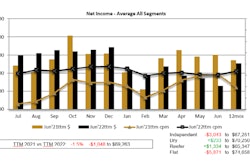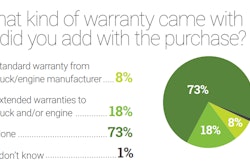One major mistake many owner-operators make when considering the move to run under their own authority is to underestimate the total cost of operations.
Consider all of these areas and decide if you are going to handle them yourself or pay somebody else to handle them for you:
- Rates and lanes
- Compliance
- Safety
- Drug testing
- Hours of service
- Accounting
- Fuel tax
- Mileage tax
Compliance, safety, drug testing and hours of service fall under Federal Motor Carrier Safety Administration regulations. Addressing these can cause a lot of stress and confusion. Also under FMCSA is the new entrant safety audit. New entrants to trucking face a shortened deadline for correcting problems found: corrective action plans can be required in as few as 10 days in some cases.
Have in place a drug and alcohol testing program, as well as one for storing hours of service and vehicle maintenance records.
When you are operating as a carrier, you won’t always receive 1099s for the revenue you generate. You’ll need an accounting system that tracks all income and expenses.
Develop a system for invoicing, accounts receivable and tracking fuel and mileage taxes. The latter two require filing the appropriate forms, something some carriers handle for leased owner-operators. With your own authority, of course, you are the carrier. You are responsible for accounting for income and revenue for federal and state tax purposes, heavy vehicle use (2290) tax, fuel tax, mileage tax in states that apply it, and more. You or a third-party specialist in this area will need to track all miles and gallons of fuel purchased in each state in order to file your IFTA forms. You will also need to file mileage tax forms in New York, Kentucky, New Mexico and Oregon if you travel through any of those states in any given quarter.

Finally, it’s possible that you would be better off forming a limited liability company (LLC) or an S Corp for tax reasons before getting your own operating authority, rather than simply continuing on as a sole proprietor. Explore the question of business and tax structure with your business services provider or accountant before starting the application process.
[Related: How to set up an owner-operator business to file as an S Corp and save on self-employment tax]
This may sound like a lot of work, and it is. Going independent can be a great opportunity, but it can be your worst nightmare if you fail to plan and execute properly. If this is your goal, create your plan, count the costs, create your budget, and follow through.
The Partners in Business program is produced by Overdrive and the consultants at ATBS, the nation’s largest owner-operator business services firm. Download the comprehensive "Partners in Business" owner-operator business manual, covering topics from start-up to expansion with multiple trucks. There, find much more information about the ins and outs of safety, maintenance and business processes, among a myriad other topics.









